|
|
|
Sort Order |
|
|
|
Items / Page
|
|
|
|
|
|
|
| Srl | Item |
| 1 |
ID:
125772


|
|
|
|
|
| Publication |
2013.
|
| Summary/Abstract |
People building their own houses have, at least theoretically, substantial autonomy when choosing, for example, a heating system and windows. In this article, focus is on the process of building new single-family houses and how energy efficiency and energy-efficient technology are incorporated into the building process. The conclusions emphasize energy as only one factor in housing purchase decisions. It is a big challenge to make low-energy building important to consumers. Consumer preferences for new products are unlikely to fully develop unless individuals have the opportunity to interact with them. It is difficult for consumers to know what to ask for if they lack experience of energy-efficient technologies. In the studied cases, the building codes and established standards became extremely decisive for how energy issues were included in the process. There is a need to change the design of incentives so as to make the least energy-efficient choice the most expensive. The most energy-efficient solution should be standard, and if the buyer wants to depart from that standard and build using less energy-efficient construction, then that should cost more.
|
|
|
|
|
|
|
|
|
|
|
|
|
|
|
|
| 2 |
ID:
096083
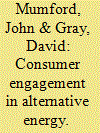

|
|
|
|
|
| Publication |
2010.
|
| Summary/Abstract |
The introduction of alternative energy requires collaboration between consumers, energy suppliers and regulators. A fundamental question is, will consumers engage with this agenda and, in particular, will they trust the institutions sufficiently to enable the collaborations that are needed. Present indications suggest that consumers have little trust in the established institutions and tend to reject such collaborations.
This article presents two case studies which explore the way consumers, regulators and energy suppliers interact in relation to alternative energy projects. It analyses the inter-group interactions from the perspective of symbolic interactionism and discusses the aspects that undermine trust, leading to suggestions for improved trust.
|
|
|
|
|
|
|
|
|
|
|
|
|
|
|
|
| 3 |
ID:
029900


|
|
|
|
|
| Publication |
San Francises, Canfield Press, 1972.
|
| Description |
xi, 401p
|
| Standard Number |
0063827956
|
|
|
|
|
|
|
|
|
|
|
|
Copies: C:1/I:0,R:0,Q:0
Circulation
| Accession# | Call# | Current Location | Status | Policy | Location |
| 010007 | 381.3/GAS 010007 | Main | On Shelf | General | |
|
|
|
|
| 4 |
ID:
085432
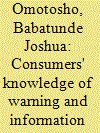

|
|
|
|
|
| Publication |
2008.
|
| Summary/Abstract |
In spite of the efforts to safeguard consumers' health through product regulations, reports revealed that diseases and illnesses due to unhygienic production and consumption are on the increase. This study examined knowledge of consumers about information and warning labels on selected products in Ado Ekiti in southwestern Nigeria. Findings from the study revealed that respondents had average knowledge of information labels on the selected products. Also, a majority of the respondents did not check information on products before purchase and consumption. Chi-square results further showed relationships among some variables tested. The article recommends ways by which higher knowledge could be achieved.
|
|
|
|
|
|
|
|
|
|
|
|
|
|
|
|
| 5 |
ID:
150412


|
|
|
| 6 |
ID:
125524


|
|
|
|
|
| Publication |
2013.
|
| Summary/Abstract |
Financial pressure and concern for the environment has meant many consumers are aware of the need to reduce their consumption of many resources, including energy, which is the focus of the present study. While potential energy use deterrents in the form of access constraints and price increases are forms of extrinsic control, it is not clear how effective these are at reducing consumption and, indeed, it is not clear if such measures are consistent with people's underlying energy saving motivations. Beyond behavioural motivations, people's desires to reduce energy can be thwarted (barriers) and/or supported by a variety of factors, some within their control, while others are perhaps less so. Using a practice-based framework and a qualitative focus group approach, this study presents an exploratory study of these issues. Policy suggestions for overcoming barriers, as well suggestions as to how energy saving behaviours can be supported are offered.
|
|
|
|
|
|
|
|
|
|
|
|
|
|
|
|
| 7 |
ID:
096141


|
|
|
|
|
| Publication |
2010.
|
| Summary/Abstract |
This paper aims to determine the factors that have an impact on the consumers' willingness to pay a premium for hybrid automobiles in Turkey. A web-based random survey was conducted in different regions of Turkey. A questionnaire was administered to 1983 participants in January-March of 2009. The questionnaire was prepared by taking the issues raised in various sources into account. An ordered Probit model was used to meet the objective. Results show that variables such as income, gender, education, concerns about global warming, number of automobiles, importance of automobile performance, risk preference, attitude toward the alternative energy sources have an impact on the consumers' willingness to pay a premium for hybrids. Findings suggest that consumers who have high income, higher educational level, and concerns about the global warming are more likely to pay a premium for hybrids. This study is expected to make important contributions to the current literature related to the consumers' willingness to pay for hybrids by providing a research study from a developing country's perspective. Results of this study also make important contributions to the policy and decision makers, environmental groups and automotive industry.
|
|
|
|
|
|
|
|
|
|
|
|
|
|
|
|
| 8 |
ID:
180073
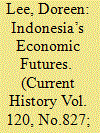

|
|
|
|
|
| Summary/Abstract |
Financial innovations stemming from the digital economy have transformed Indonesians’ everyday lives. “Superapps” offering ride sharing and an array of other services have delivered many conveniences to consumers, while also trapping many in cycles of debt. The state has responded with little more than public awareness campaigns, urging consumers to develop their own digital literacy to avoid scams. Corruption at the state level, meanwhile, remains pervasive, as shown by scandals exposed by the COVID-19 pandemic. Construction of a new capital city will be another test of financial transparency.
|
|
|
|
|
|
|
|
|
|
|
|
|
|
|
|
| 9 |
ID:
122828
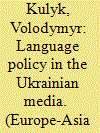

|
|
|
|
|
| Publication |
2013.
|
| Summary/Abstract |
This article deals with language policy in one crucial domain, the media. It treats language policy as the interaction between actions or inactions of the authorities, producers and consumers contributing to change or continuity of existing practices. It is argued that the main long-term contribution of all three actors, despite some notable changes, is the maintenance of the status quo characterised by the coexistence of Ukrainian and Russian with the predominance of the latter language. In particular, consumers mostly maintained their accustomed language preferences, although they did not resort to any protest actions when those preferences were disregarded.
|
|
|
|
|
|
|
|
|
|
|
|
|
|
|
|
| 10 |
ID:
120911
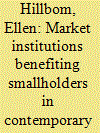

|
|
|
|
|
| Publication |
2013.
|
| Summary/Abstract |
Smallholders in developing countries can potentially benefit from access to local, regional, national and international markets as they intermediate between rural and urban demand for agricultural products and smallholder supply. This study investigates how smallholders in Meru, Tanzania make use of the various marketing channels that are available to them, and argues that the variety of potential marketing channels and easily accessible market information enables smallholders to weigh advantages and disadvantages with varying market opportunities and form rational decisions. It presents a case where producers, consumers and traders are the principal agents in building market institutions through what should be characterised as endogenous processes. As these market institutions correspond to smallholders' needs, they may be able to play an important role in the overall process of agricultural development in the area.
|
|
|
|
|
|
|
|
|
|
|
|
|
|
|
|
| 11 |
ID:
128462


|
|
|
|
|
| Publication |
2014.
|
| Summary/Abstract |
This article examines the historical legacy of contemporary development alliances through an analysis of the British government's Empire Marketing Board poster campaign from 1926 to 1933. The primary aim of these posters was to instil in the British public a preference for buying empire-grown goods and the significance of their role as consumers in maintaining the Empire. By conveying messages of a common humanity and invoking a visual language of interdependence between Britain and its colonies, the posters attempted to open up new connections and create new moral communities across distance in ways that are not dissimilar to fair trade campaigns today.
|
|
|
|
|
|
|
|
|
|
|
|
|
|
|
|
| 12 |
ID:
096080


|
|
|
|
|
|
|
|